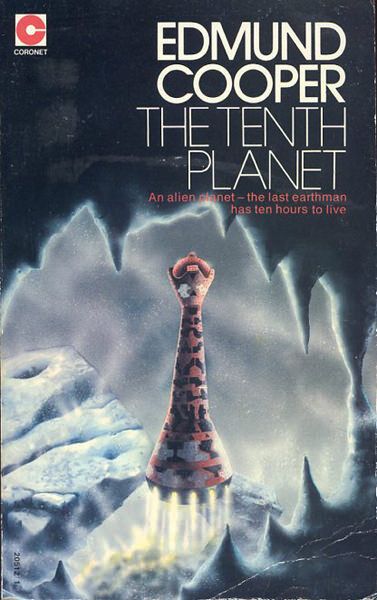Smiles Awake You When You Rise
The Tenth Planet
By Edmund Cooper

15 Nov, 2020
Because My Tears Are Delicious To You
0 comments
Edmund Cooper’s 1973 The Tenth Planet is a standalone SF novel.
Having challenged the Earth’s capacity to accommodate overpopulation and pollution (and lost), the bulk of humanity faces an inevitable demise due to rapid-onset climate change and the chaos that follows. Everyone on Earth, even the large-breasted women, will die. Only the colonies on the Moon and on Mars might survive what is to come.
Under Idris Hamilton’s command, the Dag Hammarskjold sets off from Woomera, intent on delivering one last cargo of children slumbering away in cold sleep. Scarcely has the spacecraft set out than three explosive devices set by saboteurs, disgruntled at being left behind, blow the Dag Hammarskjoldapart, killing all aboard.
Five thousand years later…
Waking is a bewildering experience for Idris. Despite their concern for his mental well-being should he learn the truth, his hosts eventually reveal that he is currently a brain in a jar, recovered from deep space and laboriously revived. Not to worry, however: not only did a lucky handful also survive the Dag Hammarskjold’s destruction, but Science! can clone Idris a new body.
Other news is less happy. The Moon colonies, for example, were not viable and soon died out. Mars provided humanity with a new home for an additional two thousand years. What hostile environment did for the Moon, human contrariness and an abundance of nuclear weapons did for the Martian humans.
Idris’ hosts are the descendants of refugees who fled Mars’ nuclear wars for a new home out in the stars. En route, they discovered Minerva, the Sun’s tenth planet. Under the direction of a charismatic visionary, the refugees settled frigid Minerva. For three thousand years the community has survived, avoiding doom with strict discipline.
Idris soon determines that he does not care for the Minervan way of life. The Minervans fear and shun novelty; they carefully constrain their own behavior in the name of communal survival. Someone like Idris, given to violent outbursts when frustrated, will never fit in.
Idris has a solution: lend him Minerva’s sole functioning space ship so that he can travel back to Earth. He hopes to find life that survived the 21stcentury eco-catastrophe. The more conservative Minervans have what they believe is an even better solution: wait for Idris to commit some egregious crime and exile him to the frozen surface of Minerva, where nature will soon put an end to him.
Idris must refrain from egregious crimes. Easy? Not for Idris.
~oOo~
The description of Earth’s demise is not a million miles from the Carnian Pluvial Event. In the short term this is catastrophic for humans, since their crops fail. But, given that life survived the Carnian, Idris’ belief that there’s still life on Earth does not seem unreasonable1.
This is the sort of disco era SF novel in which any mention of women (even of murdered women) is accompanied by comments on their cup-size.
That delicious computer queen with the fantastic boobs?
Breast assessment is something of a running theme in the novel. Not only that, but it’s a plot point that Idris, while rough and animalistic in bed (he’s essentially a rapist) is so virile that sex with him will restore a prematurely aged woman’s sagging breasts to youthful perkiness.
Idris is also grumpy, violent, judgmental, and impatient. This greatly complicates his efforts to commandeer a spacecraft, as he cannot contain his anti-social impulses long enough to succeed. One gets the sense the reader is supposed to sympathise with Idris rather than the boring, conservative Minervan rulers. This reader didn’t. The Minervans have managed to keep a civilization going for three thousand years on a very hostile world; Idris finds it hard to go a whole week without punching someone in the snoot.
I was struck by the contrast between The Tenth Planet and Moon of the Crusted Snow, which I reviewed yesterday. Both books are about surviving catastrophe. But whereas Crusted Snow applauds a peaceful, cooperative First nations community and paints the assertive white visitor as a villain, The Tenth Planet takes the side of the disruptive, violent outsider. I didn’t plan this contrast, but there it is.
I didn’t read all that many Cooper novels when I was a teen. Rereading this one reminds me why.
The Tenth Planetis available here (Amazon US), here (Amazon Canada), here (Amazon UK), here (Barnes & Noble), here (Book Depository), but it does not appear to be available from Chapters-Indigo.
1: Why head to another star if Earth has life? Perhaps the refugees who fled Mars eschewed Earth as being too close to Martian thermonuclear weapons.
This seems like a good place to observe that Minervan claims that Martian civilization destroyed itself are never verified.
